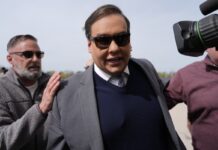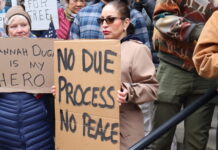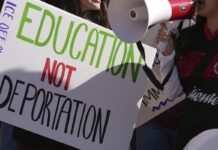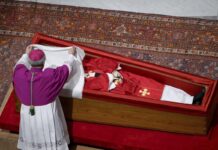
(GA Recorder) — The Georgia Republican Party chairman and a close advisor to former President Donald Trump were dealt setbacks this week in a Fulton County investigation into potential illegal interference in the 2020 presidential election.
Fulton County Judge Robert McBurney ruled on Wednesday that Georgia GOP Chairman David Shafer cannot be represented by the same attorneys as 10 other Republican electors who were subpoenaed to testify about their roles in casting false electoral votes for Trump in the aftermath of his loss to President-elect Joe Biden. McBurney’s ruling comes a day after the South Carolina Supreme Court ordered former White House chief of staff Mark Meadows to testify in the wide-spanning probe in which a special grand jury is tasked with recommending whether Fulton prosecutors should pursue criminal charges that could include solicitation and conspiracy to commit election fraud.
McBurney said that an impartial lawyer would not advise 10 of the alternate electors to share counsel with Shafer and that their attorneys, Kimberly Burroughs Debrow and Holly Pierson, have to decide to represent either Shafer or the other alternate Republican electors who were subpoenaed in July.
McBurney said that Shafer’s potential complicity to criminal charges is much higher than the other electors since he had a role in coordinating the meeting in which the fake electors cast their false ballots in favor of Trump after the controversial election.
Attorneys for the electors argued there was not a conflict of interest since Shafer and the other electors have similar interests and had not broken the law by casting votes in anticipation of courts overturning the election. During that time, there were last-ditch efforts of failed lawsuits challenging results under unfounded claims of election fraud securing Biden’s victory in Georgia by about 12,000 votes. On Jan. 6, insurrectionists breached the U.S. Capitol as Trump sought to prevent Congress from certifying the election.
“Given the information before the Court about his role in establishing and convening the slate of alternate electors, his communications with other key players in the District Attorney’s investigation, and his role in other post-election efforts to call into question the validity of the official vote count in Georgia, the court finds that he is substantively differently situated from the other ten clients jointly represented by Pierson and Debrow,” McBurney wrote.
According to a report released by Brookings Institute on Nov. 14, signs are indicating that Trump is at risk of prosecution and several of his closest allies have already been caught up in the investigation, including former personal attorney Rudy Giuliani, U.S. Sen. Lindsey Graham and Meadows, who on Tuesday, was denied by the South Carolina Supreme Court a motion to quash the summons to testify in Georgia.
Meadows was on Trump’s telephone call with Georgia Secretary of State Brad Raffensperger in January 2021 when Trump urged Raffensperger to secure enough votes for him. Meadows also visited Cobb County’s election office in December 2020 but was prevented from viewing an election audit.
A recording of that conversation led Fulton County District Attorney Fani Willis to pursue the lengthy special investigation that has allowed jurors to hear from dozens of witnesses for up to a year before making their report.
Fulton prosecutors last week questioned Graham about a phone call he had with the secretary of state about disqualifying absentee votes in the 2020 election. The South Carolina Republican lawmaker has said was acting in his congressional capacities as chair of a judicial committee and certifying the election when he contacted Georgia election officials.
Two more Trump confidants, former Republican U.S. House Speaker Newt Gingrich and former national security adviser Michael Flynn, are battling subpoenas in court.







